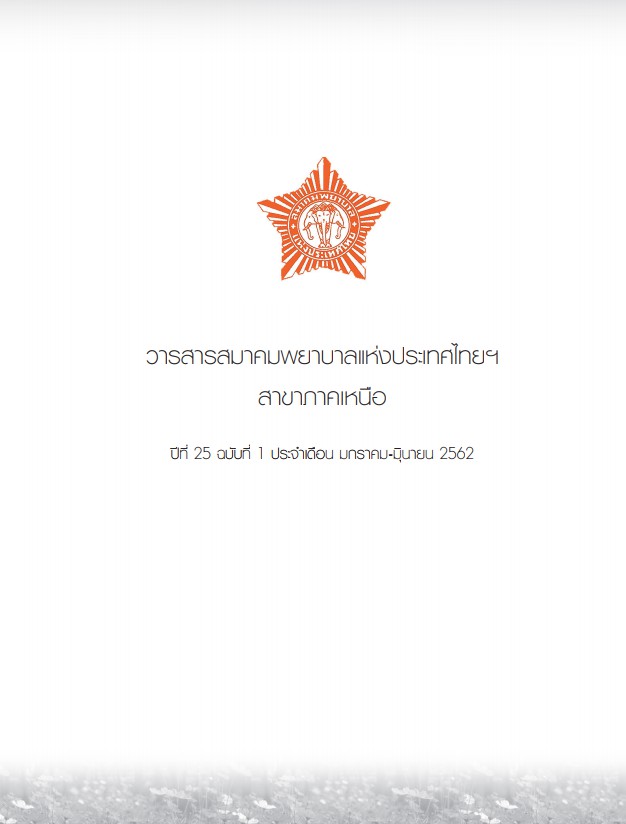Effects of Case Study Learning on Systemic Thinking Skill of McCormick Nursing Students in Maternal-Child Nursing and Midwifery Practicum II Subject
Keywords:
Case study scenario learning, Systemic thinking, Nursing studentAbstract
This Quasi-experimental research aimed to study the effects of case study Learning on systemic thinking skill of the nursing students. The 58 samples were senior nursing students in McCormick Faculty of Nursing, Payap University who enrolled in the Maternal- Child Nursing and Midwifery Practicum II (SN. 485) in 2018. Purposive sampling was used. The 29 samples were assigned equally in number to the experimental group and control group. Research instruments included case study scenario and the questionnaires consisted of 2 parts namely demographic data and systemic thinking evaluation form. Data were collected between September 2018 - June 2019 then analyzed using descriptive statistics and t – test. The results showed that there were no statistical differences of the mean score of systemic thinking (P <.05) among that the experimental group and the control group. However, there were statistical differences of the mean score of systemic thinking (p< .001) in the experimental group before and after receving the case study scenario. The findings reflect that learning and teaching usingcase study scenario help promoting and developing systemic thinking in nursing student.
References
2. Sykes, G., and Bird, T. Teacher education and the case idea.Washington, DC: American Educational Research Association; 1992.
3. Barrows, H. S., and Tamblyn, R.M. Problem-Based Lerning. An Approach to Medical Education. New York: Springer publishing company; 1980.
4. Bransford, J.D., Brow A.L., and Cooking (Eds.) R.R. How People Learn: Brain, Mind, Experience, and School: Expanded Edition Washington, DC:National academy press. Teachers’ Challenges and Assessment Knowledge. Journal of Science Education and Technology. 1999; 21(2): 207-225.
5. Zohar, A., and Dori, Y. J. Higher Order Thinking Skills and Low Achieving Students: Are They Mutually Exclusive? Journal of the Learning Sciences. 2003; 12(1): 145-181.
6. Dori, Y. J., and Herscovitz, O. Teaching Thinking Skills in Context-Based Learning: Teachers’ Challenges and Assessment Knowledge. Journal of Science Education and Technology. 1999; 21(2): 207-225.
7. Herreid, C. F. Case Studies in Science–A Novel Method of Science Education. Journal of College Science Teaching. 1994; 23(4): 221–229.
8. Herreid, C.F. What Is a Case? Journal of College Science Teaching. 1997; 27(2): 92–94.
9. สุคนธ์ สินธพานนท์ และคณะ. การจัดกระบวนการเรียนรู้: เน้นผู้เรียนเป็นสำคัญตามหลักสูตรการศึกษาขั้นพื้นฐาน. กรุงเทพฯ: อักษรเจริญทัศน์; 2545.
10. มกราพันธุ์ จูฑะรสก. การคิดอย่างเป็นระบบการประยุกต์ใช้ในการเรียนการสอน (ฉบับปรับปรุง) กรุงเทพฯ: โครงการสวัสดิการวิชาการ สถาบันพระบรมราชชนก; 2556.
11. เยาวลักษณ์ โพธิดารา. การจัดการศึกษาทางการพยาบาล: สำหรับนักศึกษา Generation Y. วารสารพยาบาลศาสตร์และสุขภาพ. 2554; 34(2): 61-69.
12 Burns, N., and Grove. S.K. The practice of nursing research: Appraisal, synthesis and generation of evidence (6th ed). St. Louis, MO: Elsevier Saunders; 2009.
13. ทิศนา แขมมณี. ศาสตร์การสอน: องค์ความรู้เพื่อการการจัดกระบวนการเรียนรู้ที่มีประสิทธิภาพ (พิมพ์ครั้งที่ 17). กรุงเทพฯ: จุฬาลงกรณ์มหาวิทยาลัย; 2556.
14. สกลสุภา อภิชัจบุญโชค. การพัฒนารูปแบบการจัดการเรียนรู้แบบกรณีศึกษาและความสามารถในการประเมินสภาพปัญหาการหายใจในหอผู้ป่วยวิกฤตทารกแรกเกิดของนักศึกษาพยาบาล.วชิรเวชสาร. 2558; 59(3): 25-34.
15. พชรมณฑ์ หมวดนุ่ม และสุเทพ อ่วมเจริญ. การพัฒนาความสามารถในการคิดเชิงระบบเพื่อเชื่อมโยงการเขียนโดยใช้เทคนิคผังกราฟิกของนักเรียนชั้นประถมศึกษาปีที่ 6. วารสารศิลปากรศึกษาศาสตร์วิจัย. 2557; 6(2): 195-207.
Downloads
Published
How to Cite
Issue
Section
License
บทความที่ได้รับการตีพิมพ์เป็นลิขสิทธิ์ของสมาคมพยาบาลแห่งประเทศไทยฯ สาขาภาคเหนือ
เนื้อหาและข้อคิดเห็นใดๆ ที่ตีพิมพ์ในวารสารสมาคมพยาบาลฯ ถือเป็นความรับผิดชอบของผู้เขียนเท่านั้น ผู้เขียนบทความต้องศึกษารายละเอียดหลักเกณฑ์การจัดทำต้นฉบับตามที่วารสารกำหนด และเนื้อหาส่วนภาษาอังกฤษต้องได้รับการตรวจสอบจากเจ้าของภาษามาแล้ว


